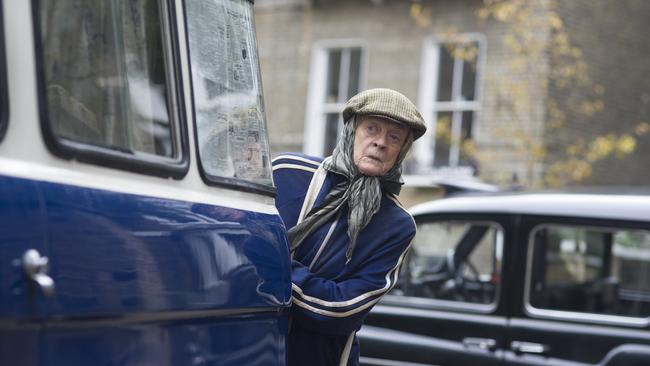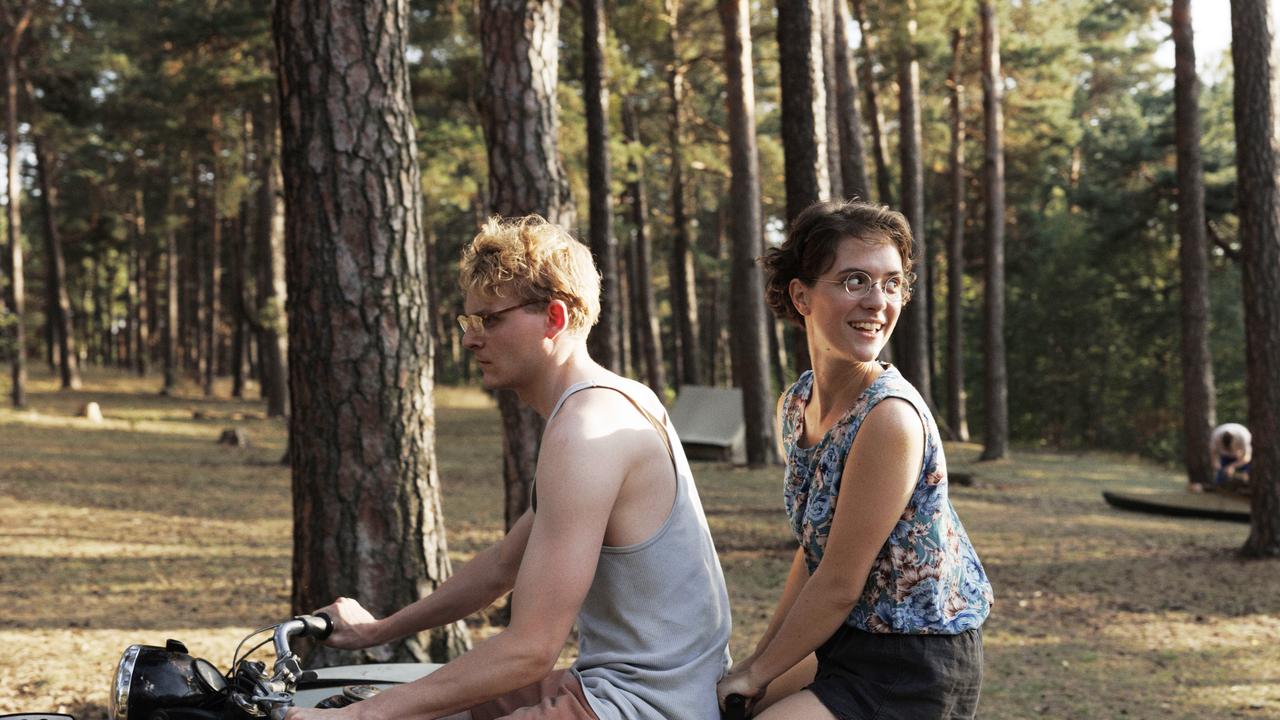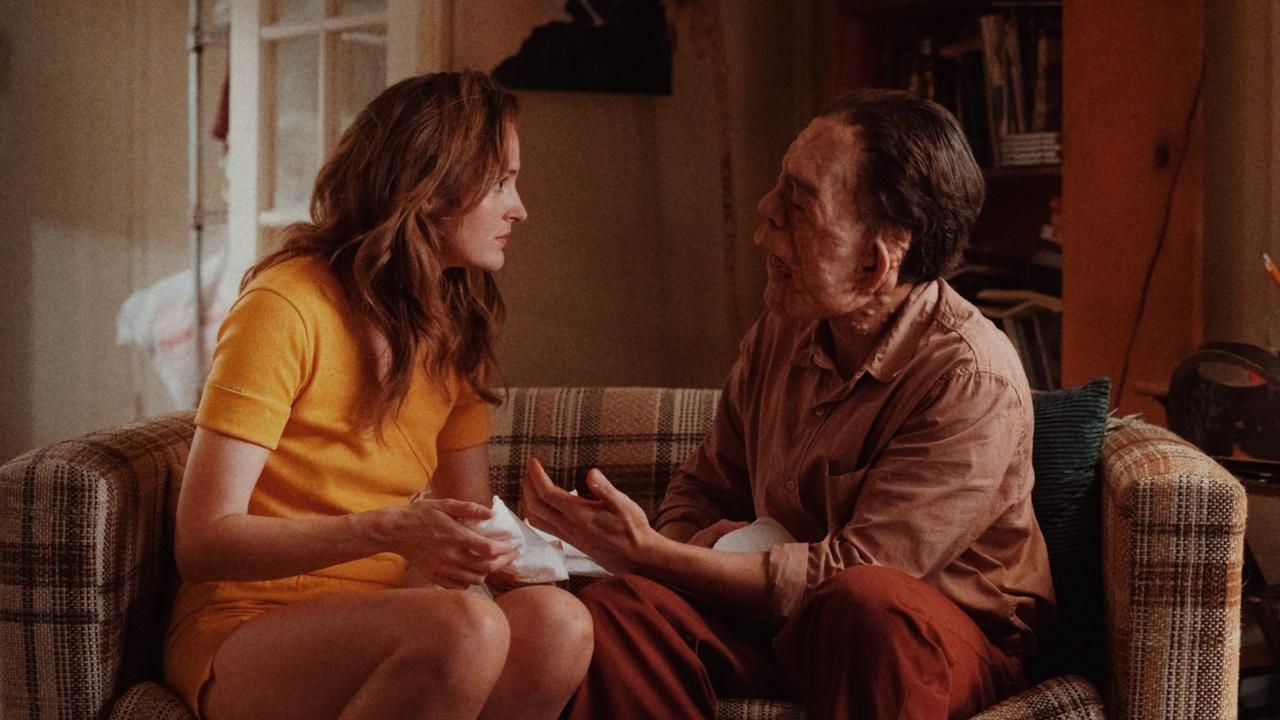Maggie Smith shines in Lady in the Van, by playwright Alan Bennett
Maggie Smith is back in a role that finds her more cantankerous than ever and living in the back of a dirty van.

In 1970, an eccentric old lady who lived in a van overflowing with carrier bags and all sorts of stuff, moved into Gloucester Terrace, Camden Town, which happened to be the London street in which playwright Alan Bennett lived. After some deliberation, Bennett reluctantly gave permission for the old woman, who called herself Mary Shepherd, to park her van in his drive and to use his toilet — and she stayed there for 15 years.
Inspired by the eccentricities of the less than gracious Miss Shepherd, Bennett wrote a slim memoir that he turned into a play directed by former National Theatre director Nicholas Hytner. The play starred Maggie Smith as Mary Shepherd and Alex Jennings as one of the Alan Bennetts; there were two because Bennett had the idea of splitting his character into the active Bennett who engages with Miss Shepherd, his neighbours and the outside world in general, and the Bennett who is private and reclusive and who does all the writing. In the film version, which is also directed by Hytner and also stars Smith, Jennings plays both Bennetts.
The Lady in the Van is, as the opening title informs us, a “mostly true story”. And it’s as charming and enjoyable as it is decidedly lightweight. Smith has a field day as the decaying, smelly, cantankerous old party who is both infuriating and amusing. She adopts a vocal style that makes her sound like that great British character actress of another era, Margaret Rutherford; and she gives a scene-stealing performance of epic dimensions.
Bennett suggests that he allowed Miss Shepherd to park her van in his drive for all those years because of guilt — the guilt he felt about neglecting his mother (Gwen Taylor), but whatever his motives the result is a film filled with relishable scenes and a couple of terrific performances.
Alongside Smith’s curmudgeonly geriatric, Jennings can’t help but appear vaguely bemused, but he does this very effectively and the scenes in which he talks to “himself” are expertly written and performed. As a Greek chorus of chatty, sardonic neighbours, Roger Allam, Deborah Findlay and Frances de la Tour, flesh out the small cast, with Jim Broadbent also making an appearance as someone from Miss Shepherd’s past.
It’s her past that interests us. How did a woman who is clearly well educated come to live in abject poverty in the back of a rubbish-filled van? Bennett delves into a backstory that involves Miss Shepherd’s success as a pianist and the unhappy life she spent as a nun. These revelations, and the enigmatically depicted car accident that opens the film, evidently have had a haunting effect on Miss Shepherd for many years — she can’t stand listening to classical music — and they suggest that a very different treatment might have been attempted; a more serious, thoughtful exploration of how a woman like Miss Shepherd wound up the way she did.
But Bennett and Hytner, who previously collaborated on the plays The Madness of King George and The History Boys, and the film versions of both, want to entertain. Miss Shepherd is never presented as a tragic figure; she’s disarmingly eccentric and we’re encouraged to be amused by her — which, of course, we are because Smith is so utterly beguiling in the role. Thank goodness for her because the film is otherwise pretty slight, and the fanciful conclusion seems miscalculated.
Hungarian film Son of Saul, which won the Grand Prix (second prize) at Cannes last year, surprisingly has not created a storm of controversy as it has opened slowly in art house cinemas around the world. While many have been impressed by the sheer skill and courage demonstrated by director Laszlo Nemes in his first feature film, others have described it as obscene and repellent. It is certainly one of the most, if not the most, confronting films I’ve seen. At the press screening I attended, one serious and important film critic left the theatrette before the halfway mark, later explaining that the film was just too much to take.
There have been, of course, films about the Holocaust before, some of them very fine. One of the best is Alain Resnais’s Night and Fog (1955) in which the director of Hiroshima Mon Amour used horrific actuality footage shot in the camps and a strangely calm narration to insist on the necessity never to forget what happened in those unspeakable places. Schindler’s List (1993) was a very different experience as one of the world’s most populist directors, Steven Spielberg, adapted Thomas Keneally’s unforgettable novel into a film designed to tell the story of one courageous man and, through his story, remind a new generation about the Nazi horrors 50 years after they occurred. Far more problematic was Italian comic Roberto Benigni’s Life is Beautiful, a worldwide hit and Oscar winner that always seemed to me questionable, to put it mildly, in its approach to the subject.
Son of Saul centres on a sonderkommando, a prisoner briefly elevated by the Germans to assist them in their monstrous work. These men consisted of Hungarians and Poles, among others, and their common language was Yiddish. They fulfilled the kind of role immigrant workers carry out in Western societies, doing the dirty work that the rest of society doesn’t want to have anything to do with. Working as a sonderkommando, the film explains, doesn’t mean survival; on the contrary, it only postpones the same fate that awaits all the Jews in the camp. Why, then, they agree to do it is a question that lingers through the film. Is it just to earn a few more days, time in which, perhaps, there may be hope for long-term survival?
The camp depicted in the film is Auschwitz-Birkenau, the most notorious extermination centre, and the protagonist is the significantly named Saul Auslander (Foreigner or Outsider), who is portrayed with steely intensity by non-professional actor Geza Rohrig. The opening scenes set the stage as Auslander and his comrades assist the Nazis to process a new trainload of victims, who are forced to undress and herded into the gas chambers. I should stress that the film doesn’t actually show these horrors. The camerawork clings to the character of Auslander like a leech, keeping him in focus while in the background the fate of the victims is so out of focus as to be (deliberately) undecipherable. But though we can’t — mercifully — see the horrors we can hear them, and the soundtrack is filled with cries and whispers, commands and screams. It is truly chilling.
The narrative, scripted by the director and Clara Royer, involves Auslander’s attempts to arrange an Orthodox funeral service for the youth he believes, probably incorrectly, is his son. His obsessive behaviour, in the midst of so much horror and death, provides chilling drama, and the performance of Rohrig (known in Hungary as a poet) is utterly compelling. Technically, too, the film is outstanding with its unsettling soundtrack (Tamas Zanyi) and fine photography (Matyas Erdely). But to say that this is a challenging experience is an understatement.
The Lady in the Van (M)
3.5 stars
National release from Thursday
Son of Saul (Saul Fia) (M)
4 stars
Limited release



